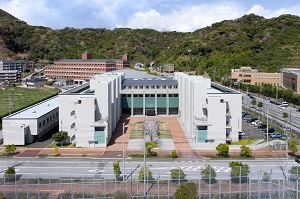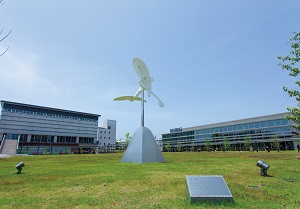本文
Doctoral Program Policies ~Graduate School of Human Life Sciences~
Admission Policy
The foundation of the Doctoral Program is education and research based on human life science, with the aim of fostering individuals who possess as independent researchers the ability to support knowledge-based society and the ability to take on the next generation of higher education. Accordingly, the Doctoral Program seeks individuals with the following qualities.
1. An interest in social life issues, a clear sense of purpose, a deeply inquisitive mind, and a desire to use research methods to solve problems
2. Strong enthusiasm for resolving issues and willingness to engage in academic research
3. Deep knowledge in the area of specialization, flexible thinking skills, and creativity
4. A cooperative, collaborative, and harmonious nature, rich in humanity, enabling work with people in communities from the perspectives of nutrition and human life, social welfare, and culture; the ability to plan and implement the systematization of communities; a sense of research ethics that enable contribution to the improvement of human life; and aspirations to become a researcher and professional in higher education.
Selection Policy
The examination for admission to the Doctoral Program consists of a written portion, a portion specific to the applicant’s area of specialization, an oral portion, and submittal of a research plan. These are used to make a comprehensive evaluation of the following abilities.
Written test: Evaluate the candidate’s ability to read and understand the content of text written in English and answer question(s) based on the text.
Area Specific Test:
1) Essay writing (Social Welfare Studies and Cultural Studies): Evaluate the applicant’s expertise, logical, theoretical, and analytical thinking skills, creativity, and ability to accurately comprehend and answer questions.
2) Presentation (Nutrition and Human Life Sciences): Evaluate the originality of the research that the applicant has conducted, the completeness of the presentation materials, the applicant’s attitude, the consistency of the presentation with the research plan, and answers to questions from the examiners.
Interview: Evaluate the specialization of the applicant’s intended area and his/her abilities required to conduct research, through a presentation on the research plan, as well as questions and answers.
Research plan: Evaluate the applicant’s knowledge of his/her own research topic, the significance of the research, the research objective, the research method, and descriptions, etc.
Curriculum Policy
1. Common Policy
The objective of the Doctoral Program is to foster students’ ability as advanced professionals who can independently and continuously conduct research activities, and as educational researchers to contribute to the development of higher education, on a foundation of the knowledge and skills acquired in the Master’s Program. This course is organized according to the following principles.
(Structure and contents)
1. The curriculum consists of three areas: "Common Studies,” "Specialized Studies," and "Research Tutorial Seminar"
2. The objective of these areas of Common Studies is to foster students’ abilities to approach various issues related to human lifestyles from multiple perspectives.
3. Specialized Studies consists of three areas: "Nutrition and Human Life Sciences,” "Social Welfare studies,” and "Cultural studies.”
4. The objective of Specialized Studies is to deepen the student’s understanding of trends in academic research.
5. Research Tutorials Seminars I, Ii, and Iii help students with their research explorations.
(Evaluation)
6. Achievement goals, grading criteria, and methods aligned with the Doctoral Program Diploma Policy are made known to students.
7. Final assessment is made in accordance with the items stipulated in the Diploma Policy, which define the competence students need to attain.
8. The examination of a doctoral dissertation consists of the research plan review by the main and secondary advisors, interim report meetings, review, initial dissertation review, and dissertation defense. Then, the Academic Degree Examination Committee reviews the dissertation in accordance with the Doctoral Dissertation Examination criteria.
2. Curriculum policy by area
(1) Nutrition and Human Life Sciences
(Sequence)
1. Students start taking courses in their first year, mainly from Nutrition and Human Life studies, but also from Common Studies, Social Welfare Studies, and Culture Studies, in order to acquire a wide range of academic knowledge in multiple areas of inquiry.
2. In their first year, students master analytic knowledge and skills and take the Research Tutorial Seminar in Nutrition and Human Life Studies Special Science to enable them to set research questions in line with their own independent awareness of problems, and to design a reasonable and feasible research plan.
3. Students take Research Tutorial Seminar in Nutrition and Human Life Sciences Special Study Ii in their second year to conduct research in accordance with the research plan and consider the issues with their advisors. Students also present their research findings in the interim reporting meetings.
4. Students take Research Tutorial Seminar in Nutrition and Human Life Sciences Special Study Iii in their third year to enable them to proceed to work on their dissertations while analyzing and probing the data they have collected. The preliminary examination for submitting a dissertation is held every September. The candidate must submit the dissertation in January of the following year.
(Implementation)
5. The faculty provides support and guidance for students to engage in the coursework that will enable them to acquire the abilities stipulated in the Doctoral Program Diploma Policy for the area of their choice and proceed to complete the dissertation.
6. The selection of advisors must include two from the Nutrition and Human Life Sciences faculty (main and secondary) and secondary advisors from the other areas. If necessary, a faculty member or researcher from outside the Graduate School of Human Life Sciences can be selected as a secondary advisor.
(2) Social Welfare Area
(Sequence)
1. Students start taking courses in their first year, mainly from Social Welfare studies, but also from Common Studies, Nutrition and Life Studies, and Culture Studies, in order to acquire a wide range of academic knowledge in multiple areas of inquiry.
2. In their first year, students master analytical knowledge and skills and take Tutorial Seminar in Social Welfare Studies I to enable them to set research questions in line with their own independent awareness of problems, and to design a reasonable and feasible research plan.
3. Students take Research Tutorial Seminar in Social Welfare Studies Ii in their second year to conduct research in accordance with the research plan and consider the issues with their advisors. Students also present their research findings in the interim reporting meetings.
4. Students take Research Tutorial Seminar in Social Welfare Studies Iii in their third year to enable them to proceed to work on their dissertations while analyzing and probing the data they have collected. The preliminary examination for submitting a dissertation is held every September. The candidate must submit the dissertation in January of the following year.
(Implementation)
5. The faculty provides support and guidance for students to engage in the coursework that will enable them to acquire the abilities stipulated in the Doctoral Program Diploma Policy for the area of their choice and proceed to complete the dissertation.
6. The selection of advisors must include two from the Social Welfare Studies faculty (main and secondary) and secondary advisors from the other areas. If necessary, a faculty member or researcher from outside the Graduate School of Human Life Sciences can be selected as a secondary advisor.
(3) Cultural field
(Sequence)
1. Students start taking courses in their first year, mainly from Cultural studies, but also from Common Studies, Nutrition and Human Life Sciences, and Social Welfare Studies, in order to acquire a wide range of academic knowledge in multiple areas of inquiry.
2. In their first year, students master analytical knowledge and skills and take Tutorial Seminar in Cultural Studies I to enable them to set research questions in line with their own independent awareness of problems, and to design a reasonable and feasible research plan.
3. Students take Research Tutorial Seminar in Cultural Studies Ii in their second year to conduct research in accordance with the research plan and consider the issues with their advisors. Students also present their research findings in the interim reporting meetings.
4. Students take Research Tutorial Seminar in Cultural Studies Iii in their third year to enable them to proceed to work on their dissertations while analyzing and probing the data they have collected. The preliminary examination for submitting a dissertation is held every September. The candidate must submit the dissertation in January of the following year.
(Implementation)
5. The faculty provides support and guidance for students to engage in the coursework that will enable them to acquire the abilities stipulated in the Doctoral Program Diploma Policy for the area of their choice and proceed to complete the dissertation.
6. The selection of advisors must include two from the Cultural Studies faculty (main and secondary) and secondary advisors from the other areas. If necessary, a faculty member or researcher from outside the Graduate School of Human Life Sciences can be selected as a secondary advisor.
Diploma Policy
The objective of the Doctoral Program is to foster students’ ability as advanced professionals who can independently and continuously advance research activities and as educational researchers who contribute to the development of higher education, on a foundation of the knowledge and skills acquired in the Master's Program.
1. Common Diploma Policy
1) Students are able to grasp domestic and overseas trends in research fields with a bird's-eye view and to clarify the orientation of his/her research.
2) Students are able to add new perspectives in applying existing knowledge and technology to lead to new knowledge.
3) Students are able to conduct research that leads to policy development and decision-making that bring forth changes in human lifestyle.
4) Student have the attitudes and abilities to carry out their research endeavors independently.
5) Students have the attitudes and abilities to accomplish their research endeavors in accordance with research ethics.
2. Diploma Policy by Specialization
(1) Nutrition and Human Life Sciences
Candidates who satisfy the aforementioned completion criteria as well as the following completion criteria are awarded the degree of Doctor of Philosophy in human life science.
1. Students are able to identify a research theme from among issues related to nutrition and human life and gain outcomes that contribute to the development of this area of inquiry.
2. Students are able to publish new findings at academic conferences and in profession journals and to present proposals to society to contribute to the advancement of research on nutrition and human life.
3. Students have qualities enabling them to engage in professional education related to the next-generation field of nutrition and human life sciences at an institution of higher learning.
(2) Social Welfare Studies
Candidates who satisfy the aforementioned completion criteria as well as the following completion criteria are awarded the degree of Doctor of Philosophy in social welfare studies.
1. Identify a research theme among issues concerning social welfare and gain outcome contributing to the development of this area of inquiry.
2 .Students are able to publish new findings at academic conferences and in profession journals and to present proposals to society to contribute to the advancement of research on social welfare.
3. Students have qualities enabling them to engage in professional education related to the next-generation field of social welfare at an institution of higher learning.
(3) Cultural Studies field
Candidates who satisfy the aforementioned completion criteria as well as the following completion criteria are awarded the degree of Doctor of Philosophy in cultural studies.
1. Students are able to identify a research theme from among issues related to cultural studies and gain outcomes that contribute to the development of this area of inquiry.
2. Students are able to publish new findings at academic conferences and in profession journals and to present proposals to society to contribute to the advancement of research into cultural studies.
3. Students have qualities enabling them to engage in professional education related to the next-generation field of cultural studies at an institution of higher learning.









